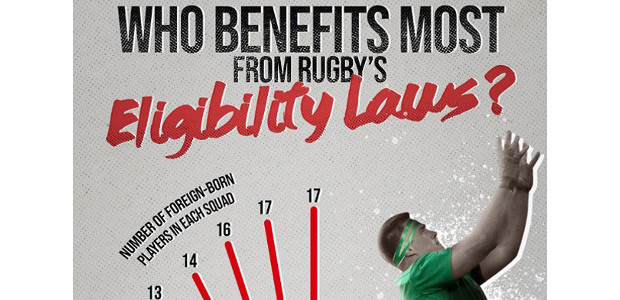What are the variables relating to Rugby’s international eligibility laws!
As this is such a fascinating topic I am absolutely delighted that we are addressing this subject and providing thoughts on the potential impacts and outcomes of changing the existing policies!
So! Outlining the implications of the subject of non-national players so to speak playing for countries through residence permits and process of naturalisation is our first endeavour.
The environment is competitive and there is a lot of money at stake. Taking time to consider the issues reveals the Immense desire of countries to compete and win against other countries and in order to do this they will consider every possibility to improve their squads. They will look at training, player recruitment, psychology, recovery. However their raw material which is players actually have to come from within the rules of who is eligible to play for the team.
Quite simply on a basic level the more access a country has to top flight athletes trained and proficient in rugby then the better potential they have to field better teams. On a simple level, if a country can access the best talent then in theory they will field a better team! Right!
The process by which players are then brought into the new team is managed in the sense that even today it is not simply a case of signing up to play for a country from another country. Then turning up to training once or twice a year and then turning up for competitions… rather the players actually very often go to live in the country they are going to be playing for. they actually train and live and play with a team in that country and of course are in regular of not daily contact with the national team of that country.
With so much having been invested by the players, the level of rugby that they play is just as high as they will play anywhere else and they will be coached as well to put aside national allegiance and instead actually focus on purely rugby and playing at the highest level they can!
Their are rules governing this and within which countries must operate. Many non nationals play in rugby leagues all over the world for professional teams but not all of them are eligible to play for that countries team. There are rules, including how long the player has been living in that country.
Historically a rule has also existed whereby if a player can show family ancestry to a country then they can play for that country. For example if an American was born in France and lives and plays in France they could still play for America if even a grandparent was American. They could also play for France… obviously not at the same time. (Please note these are laws or rules that do change over time so this article is purely exploratory)
People also have problems with this but in its purest form a player could miss out on playing for their country for some reason, due perhaps to a misunderstanding at training or something very trivial. Perhaps they are the best player in the world in their position and it does seem fair that they get a chance to play for another country… or if their country has no rugby team but they exhibit skills and acumen that makes them a great international player ( a lot of information on this is available sites like Betway) it can very strongly be argued that it is right they get a chance to play. Many athletics champions over the years who have lived in war torn countries have left their country to join another countries athletics system because they can then actually do athletics and dazzle the world!
Issues however do arise around situations where countries have large numbers of players but who are not getting to play because that country has decided to get its players from other countries. This can have knock on effects on playing levels in that country with attendance at games and player numbers dropping because for many young athletes if they feel they do not have a chance of playing for their country team then they could say “its best for me not to focus on that and actually make life changes and perhaps change sports or focus entirely in life”.
It will be very interesting to see how all of this pans out, will it lead to differences in results by countries who had been playing foreign players? Will countries strengthen or weaken, will numbers of spectators and amateurs players in countries rise or fall due to this?
Please note these changes are very very complex and it takes actual science to properly determine all the variables that effect spectator numbers and player numbers. This complexity takes years of analysis and data collection to determine trends and results that adequately reflect what is happening. This article is purely exploratory.
We love dissecting these ideas and concepts and look forward very much to following this story to see how all of this pans out!
Thank you so much!
Very Best Wishes!
InTouch Rugby Players Editor.










